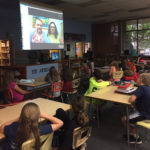This lesson introduces students to a structured approach for analyzing visual sources. Students will practice observational skills, evidence-based interpretation, and questioning techniques using the See, Think, Wonder strategy. This analytical framework supports critical thinking and visual literacy skills.
Reading Like a Historian Lessons for K-5
With the support of the Educating for American Democracy (EAD) participants and in collaboration with Los Angeles Unified School District, the Digital Inquiry Group has developed 10 new Reading Like a Historian lessons for K-5 classrooms aligned to the themes and design principles of the EAD Roadmap.
Virtual Tour of the Museum of the American Revolution
Use this virtual tour of the core galleries of the Museum of the American Revolution to explore the dynamic late 18th century through four guiding questions: How do people become Revolutionaries? How did the Revolution Survive its darkest hour? How Revolutionary was the war? What kind of nation did the Revolution create? Along the way,
Life Story: Lucille Lomen
The biography of Lucile Lomen, the first female Supreme Court Law Clerk. A native Alaskan and graduate of The University of Washington Law School, Lucile clerked for Associate Justice William O. Douglas during the 1941-1942 term. She went on to break barriers for women at the Justice Department and General Electric.
Franklin D. Roosevelt and the Court-packing Controversy -Video
In 1937 President Franklin D. Roosevelt announced his plan to enlarge the Supreme Court to as many as 15 justices. Congress debated the merits of the plan and Chief Justice Charles Evans Hughes opposed it. After 168 days the bill failed, but the lessons from the Court-packing episode are relevant today. This 15-minute documentary designed
Lessons Plans for “Franklin D. Roosevelt and the Court-packing Controversy”
These lesson plans for basic high school and for AP US History have been created for students who have watched the video. They include activities such as analyzing part of the text of FDR’s Court-packing Plan, interpreting political cartoons reacting to the plan, and discussing the intersection of the three branches of government.
Dictators and Civil Wars: The Cold War in Latin America
This 6-minute video explores how the Cold War was an ideological, and sometimes military, struggle between the United States and the Soviet Union. In general, the Soviet Union supported the expansion of communist governments around the globe, and the United States supported anti-communist regimes, including both democracies and dictatorships. By the 1950s, these tensions were seen in Latin America, and revolutions, coups, and uprisings became commonplace throughout most of the latter half of the twentieth century.
The Suffrage and the Civil Rights Reform Movements
This short comparative analysis activity involves comparing and contrasting two images of marches for freedom: a 1917 Bastille Day march for women’s suffrage, and the 1963 March on Washington for Jobs and Freedom. Students will consider the similarities and differences between these two images and hypothesize what major differences these photos might imply about the two social reform movements.
Media Literacy Booster Pack
Virtual Field Trips at Monticello

Monticello has partnered with Microsoft Skype in the classroom to bring FREE virtual field trips to your students, grades K-12. The virtual field trip lasts about 45 minutes, during which time a Monticello educator will talk to your class about Monticello using images, props, and an online virtual tour. Your students can ask the educator questions, and you can prepare your students with pre- and post-visit resources.
